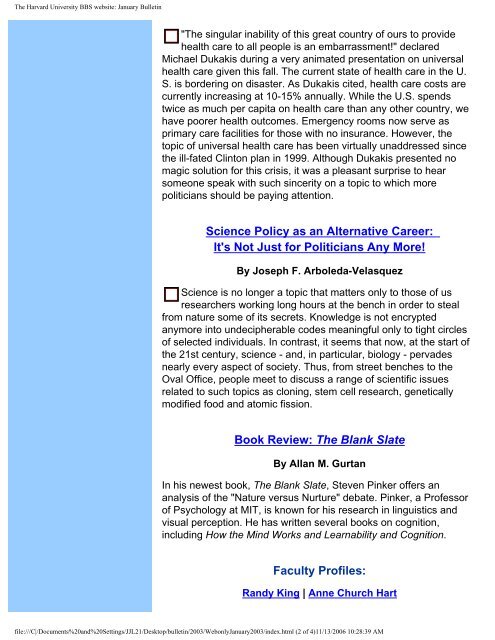January 2003 - Division of Medical Sciences Bulletin - Harvard ...
January 2003 - Division of Medical Sciences Bulletin - Harvard ...
January 2003 - Division of Medical Sciences Bulletin - Harvard ...
Create successful ePaper yourself
Turn your PDF publications into a flip-book with our unique Google optimized e-Paper software.
The <strong>Harvard</strong> University BBS website: <strong>January</strong> <strong>Bulletin</strong><br />
"The singular inability <strong>of</strong> this great country <strong>of</strong> ours to provide<br />
health care to all people is an embarrassment!" declared<br />
Michael Dukakis during a very animated presentation on universal<br />
health care given this fall. The current state <strong>of</strong> health care in the U.<br />
S. is bordering on disaster. As Dukakis cited, health care costs are<br />
currently increasing at 10-15% annually. While the U.S. spends<br />
twice as much per capita on health care than any other country, we<br />
have poorer health outcomes. Emergency rooms now serve as<br />
primary care facilities for those with no insurance. However, the<br />
topic <strong>of</strong> universal health care has been virtually unaddressed since<br />
the ill-fated Clinton plan in 1999. Although Dukakis presented no<br />
magic solution for this crisis, it was a pleasant surprise to hear<br />
someone speak with such sincerity on a topic to which more<br />
politicians should be paying attention.<br />
Science Policy as an Alternative Career:<br />
It's Not Just for Politicians Any More!<br />
By Joseph F. Arboleda-Velasquez<br />
Science is no longer a topic that matters only to those <strong>of</strong> us<br />
researchers working long hours at the bench in order to steal<br />
from nature some <strong>of</strong> its secrets. Knowledge is not encrypted<br />
anymore into undecipherable codes meaningful only to tight circles<br />
<strong>of</strong> selected individuals. In contrast, it seems that now, at the start <strong>of</strong><br />
the 21st century, science - and, in particular, biology - pervades<br />
nearly every aspect <strong>of</strong> society. Thus, from street benches to the<br />
Oval Office, people meet to discuss a range <strong>of</strong> scientific issues<br />
related to such topics as cloning, stem cell research, genetically<br />
modified food and atomic fission.<br />
Book Review: The Blank Slate<br />
By Allan M. Gurtan<br />
In his newest book, The Blank Slate, Steven Pinker <strong>of</strong>fers an<br />
analysis <strong>of</strong> the "Nature versus Nurture" debate. Pinker, a Pr<strong>of</strong>essor<br />
<strong>of</strong> Psychology at MIT, is known for his research in linguistics and<br />
visual perception. He has written several books on cognition,<br />
including How the Mind Works and Learnability and Cognition.<br />
Faculty Pr<strong>of</strong>iles:<br />
Randy King | Anne Church Hart<br />
file:///C|/Documents%20and%20Settings/JJL21/Desktop/bulletin/<strong>2003</strong>/Webonly<strong>January</strong><strong>2003</strong>/index.html (2 <strong>of</strong> 4)11/13/2006 10:28:39 AM




